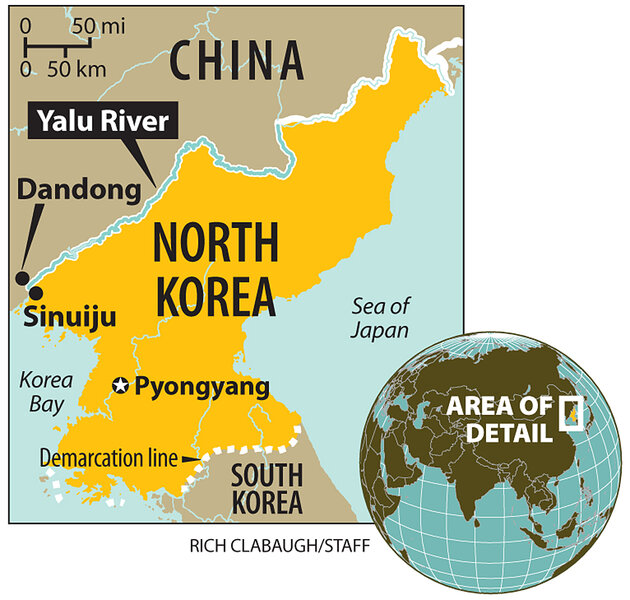North Korea floods prompt rare media candor
Loading...
| Seoul, South Korea
North Korean leader Kim Jong-il has personally ordered troops into combat – not in the “all-out war” his rhetoricians have threatened against South Korea and the US, but in the battle against floods ravaging the critical northern border city of Sinuiju.
Mr. Kim, who rules North Korea as chairman of the National Defense Commission, put his own name on orders for Army soldiers, aircraft, and naval vessels to join over the weekend in rescuing more than 5,000 people as the waters of the Yalu River swept over parts of the city, according to weekend reports.
The North Korean media credited the man whom North Koreans know as “dear leader” with acting swiftly and decisively – befitting one whom North Korean propaganda over the years has credited with hitting holes-in-one in golf, piloting fighter planes, writing revolutionary operas, and discovering amazing labor-saving techniques.
After “emergency rescue plans had shown little progress,” said the North’s Korean Central News Agency (KCNA), “the Dear Leader made an order to immediately put military forces to the rescue battle.”
Unusual media candor
Clearly on orders from Kim, KCNA offered unusually candid details. One KCNA dispatch, for example, reported that downtown Sinuiju was “paralyzed” while flood victims waited on roofs of buildings or fled to nearby hills.
KCNA rarely goes into chapter and verse on calamities that have swept the country in recent decades. And when KCNA does report natural disasters, it is likely to be long after the fact.
In this case, however, the North Korean media, fed by KCNA, appeared to want to get out the news right away, along with top mention of Kim Jong-il’s role, in an effort to buttress his prestige.
One goal, presumably, is to prepare for elevation of his third son, Kim Jong-eun, as his successor before a high-level party meeting next month at which the younger Kim may get a top post.
Glaring omissions
Still, the reports left out crucial facts. A KCNA dispatch said little about the flooding across the Yalu River in the Chinese city of Dandong, bound to Sinuiju by a long steel road and rail bridge that survived numerous US bombing runs in the Korean War. A bustling commercial center, Dandong is several times larger than Sinuiju, whose 400,000 people are said to live in run-down apartment blocks and small shacks.
There was no mention in North Korean reports of the evacuation of 250,000 people from Dandong, where North Korean traders go on buying and selling expeditions, before raging currents began to subside. At least four people were reported killed.
Nor did KCNA give the really bad news. That was up to Daily NK, a monitoring group in Seoul with contacts in the North. While helicopters were picking up trapped people, said Daily NK’s source, one helicopter “crashed into a rice paddy” on a mission “to rescue isolated residents” with the loss of its two-man crew.
North Korean central TV reported only “that helicopters had been sent to the rescue project on the orders of Kim Jong-il,” said Daily NK, but “there was no word of the crash.”
And there was no word either about rail service, though trains were assumed to have halted. Stopping in Dandong and then Sinuiju on the way to Pyongyang, freight trains from China carry most of the goods, including food and fertilizer, that North Korea needs to survive.
North Korea was expected to receive emergency aid from China but not from South Korea, whose conservative president, Lee Myung-bak, has cut off most North-South commerce. A spokesman for South Korea’s Unification Ministry, responsible for dealings with the North, said flatly that the South is not “considering the issue of resuming rice aid to North Korea.”






